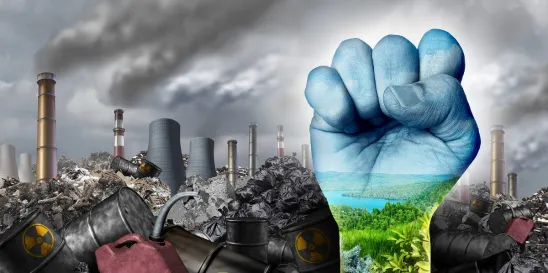On Sept. 27, 2023, the New York State Department of Environmental Conservation (DEC) released a draft policy (DEP-23-1) to implement the environmental justice provisions of the Climate Leadership and Community Protection Act (CLCPA), New York’s blueprint to reduce greenhouse gas (GHG) emissions. The policy is open for public comment until Nov. 27, 2023.
A critical underpinning of the CLCPA is ensuring that the most vulnerable communities – those disproportionately impacted by climate change – benefit from the law’s implementation and are considered in all state permitting decisions. Accordingly, DEP-23-1 provides guidance to DEC staff when considering permit applications involving sources of or activities associated with GHG emissions in disadvantaged communities.
Background
The CLCPA sets ambitious goals for reducing GHG emissions in New York state, targeting a 40% reduction below 1990 levels by 2023 and an 85% reduction by 2050. Section 7(3) of the CLCPA mandates that all state agencies, when considering and issuing permits, licenses, and other administrative approvals, avoid placing a disproportionate burden on disadvantaged communities. Furthermore, state agencies must prioritize reducing GHG emissions and co-pollutants in these disadvantaged communities.
On March 27, 2023, the Climate Justice Working Group – established by the CLCPA to advise on climate justice issues – finalized its Disadvantaged Communities Criteria, which identifies such communities for GHG and co-pollutant reduction efforts. The CLCPA defines disadvantaged communities as areas that experience adverse public health effects, environmental pollution, climate change impacts, and meet specific socioeconomic criteria. These communities often include a high concentration of low- and moderate-income households.
Policy Applicability and Implementation
DEP-23-1 applies to permit applications that involve sources and activities resulting in direct or indirect emissions of GHG or co-pollutants, such as certain water withdrawal, air pollution control, and solid waste management permits. The policy would apply prospectively to permit applications submitted after adoption of the policy, as well as those pending action by DEC to the extent feasible. The policy would also apply to both permit modifications and renewals. The proposed policy applies broadly to any project that could lead to increased GHG and co-pollutant emissions, whether directly or indirectly. This includes emissions from both stationary and mobile sources (vehicles) directly linked to and essential for the proposed action, as well as emissions from existing equipment or facilities.1
Under the draft policy, a permit subject to DEP-23-1 would first undergo a preliminary screening to identify whether the proposed action is a covered project or likely to affect a disadvantaged community.2 If a disadvantaged community is identified, the proposed project would be subject to additional permit review procedures under the policy.
If found subject to the policy, permittees must prepare a disproportionate burden report to identify and address any disproportionate burdens on the disadvantaged community and propose project conditions that prioritize emissions reduction in that community. This report must be submitted to DEC before determining the application’s completeness and will be used to establish whether the application is complete, including its compliance with the State Environmental Quality Review Act (SEQRA) determination of significance.3 Additionally, the report will be part of the completeness assessment under DEC’s Uniform Procedure Act (UPA), which sets out the agency process for issuing permits. Most disadvantaged communities will also qualify as Potential Environmental Justice Areas, triggering the requirements of CP-29, the Commissioner’s policy on Environmental Justice and Permitting.4
The disproportionate burden report and any other materials required under §7(3) of the CLCPA will be made available for public review and comment.5 Relevant public comments, the permit application, and supporting materials will then be considered when making a final decision on the permit application.
It is expected that many projects or activities subject to DEP-23-1 will also be subject to the requirements of CLCPA §7(2), which requires agencies to evaluate whether their administrative decisions, including permitting actions, align with or impede the state’s attainment of its GHG emission limits. If inconsistent, DEC must offer a statement of justification for why the limits may not be met and identify alternatives or GHG mitigation measures.
DEC has already forecasted the need to update the policy based on regulations and guidance currently under development to implement legislation Governor Hochul signed in 2022 that amended SEQRA and the UPA to require consideration of the effects of disproportionate pollution impacts on a disadvantaged community beyond the CLCPA’s requirements.
GT Insights
Release of this draft policy follows a series of other recent regulatory and policy initiatives aimed toward CLCPA implementation. These efforts include Commissioner’s Policy 49, “Climate Change and DEC Action,” and the DEC’s Division of Air Resources Policy 21, “CLCPA and Air Permit Applications.”6 New York state also completed the “New York’s Disadvantaged Communities Barriers and Opportunities Report,” which identifies the challenges disadvantaged communities face and suggests actions for state agencies to create climate mitigation, adaptation, and clean energy programs with a specific focus on climate justice.7
When finalized, DEP-23-1 will mark another milestone towards achievement of CLCPA environmental justice mandates and reduction of GHGs. It also reflects DEC’s commitment to public and community engagement in its permitting processes and, more generally, in its efforts towards accomplishing the state’s climate goals. For the regulated community, this policy is likely to have broad ramifications on projects and permits within DEC’s purview, as failure to comply could result in permit denial. Accordingly, entities with permits and projects to be impacted by the proposed policy may wish to submit comments to inform the policy. One area in need of further illumination is enumerating criteria for when DEC will decide to apply the new policy to pending permit applications. The agency must balance the new requirements with the potential for undue delay if the new requirements are imposed at the end of a lengthy permitting process. Parties preparing permit applications while this draft policy is pending should consider whether it makes sense to include the proposed analysis in their submissions in order to avoid delaying a permitting decision. Ultimately, regulated entities should monitor the final policy enacted by DEC – and other climate-related administrative actions that follow suit – to ensure that any applicable projects and activities remain compliant with CLCPA-related initiatives.
Jenna Rackerby, Law Clerk/JD, not admitted to the practice of law, also contributed to this article.




 />i
/>i

